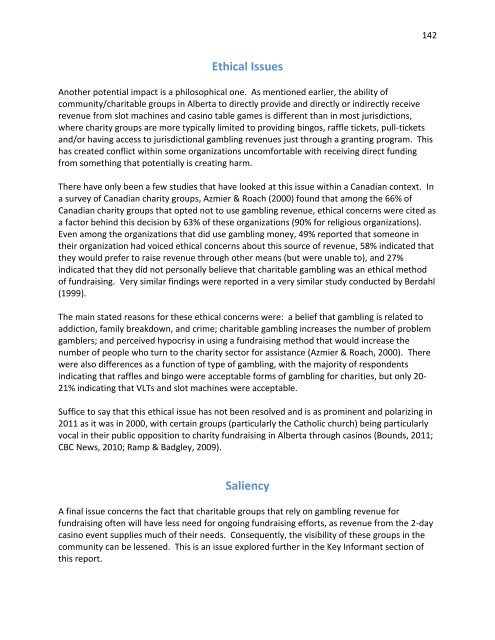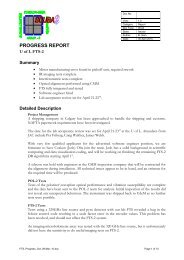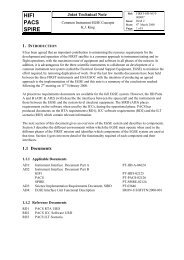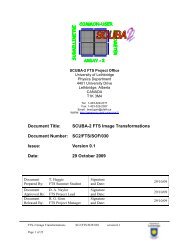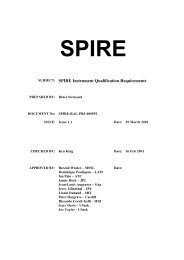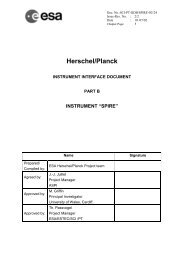gambling in alberta - Research Services - University of Lethbridge
gambling in alberta - Research Services - University of Lethbridge
gambling in alberta - Research Services - University of Lethbridge
Create successful ePaper yourself
Turn your PDF publications into a flip-book with our unique Google optimized e-Paper software.
Ethical Issues<br />
Another potential impact is a philosophical one. As mentioned earlier, the ability <strong>of</strong><br />
community/charitable groups <strong>in</strong> Alberta to directly provide and directly or <strong>in</strong>directly receive<br />
revenue from slot mach<strong>in</strong>es and cas<strong>in</strong>o table games is different than <strong>in</strong> most jurisdictions,<br />
where charity groups are more typically limited to provid<strong>in</strong>g b<strong>in</strong>gos, raffle tickets, pull-tickets<br />
and/or hav<strong>in</strong>g access to jurisdictional <strong>gambl<strong>in</strong>g</strong> revenues just through a grant<strong>in</strong>g program. This<br />
has created conflict with<strong>in</strong> some organizations uncomfortable with receiv<strong>in</strong>g direct fund<strong>in</strong>g<br />
from someth<strong>in</strong>g that potentially is creat<strong>in</strong>g harm.<br />
There have only been a few studies that have looked at this issue with<strong>in</strong> a Canadian context. In<br />
a survey <strong>of</strong> Canadian charity groups, Azmier & Roach (2000) found that among the 66% <strong>of</strong><br />
Canadian charity groups that opted not to use <strong>gambl<strong>in</strong>g</strong> revenue, ethical concerns were cited as<br />
a factor beh<strong>in</strong>d this decision by 63% <strong>of</strong> these organizations (90% for religious organizations).<br />
Even among the organizations that did use <strong>gambl<strong>in</strong>g</strong> money, 49% reported that someone <strong>in</strong><br />
their organization had voiced ethical concerns about this source <strong>of</strong> revenue, 58% <strong>in</strong>dicated that<br />
they would prefer to raise revenue through other means (but were unable to), and 27%<br />
<strong>in</strong>dicated that they did not personally believe that charitable <strong>gambl<strong>in</strong>g</strong> was an ethical method<br />
<strong>of</strong> fundrais<strong>in</strong>g. Very similar f<strong>in</strong>d<strong>in</strong>gs were reported <strong>in</strong> a very similar study conducted by Berdahl<br />
(1999).<br />
The ma<strong>in</strong> stated reasons for these ethical concerns were: a belief that <strong>gambl<strong>in</strong>g</strong> is related to<br />
addiction, family breakdown, and crime; charitable <strong>gambl<strong>in</strong>g</strong> <strong>in</strong>creases the number <strong>of</strong> problem<br />
gamblers; and perceived hypocrisy <strong>in</strong> us<strong>in</strong>g a fundrais<strong>in</strong>g method that would <strong>in</strong>crease the<br />
number <strong>of</strong> people who turn to the charity sector for assistance (Azmier & Roach, 2000). There<br />
were also differences as a function <strong>of</strong> type <strong>of</strong> <strong>gambl<strong>in</strong>g</strong>, with the majority <strong>of</strong> respondents<br />
<strong>in</strong>dicat<strong>in</strong>g that raffles and b<strong>in</strong>go were acceptable forms <strong>of</strong> <strong>gambl<strong>in</strong>g</strong> for charities, but only 20-<br />
21% <strong>in</strong>dicat<strong>in</strong>g that VLTs and slot mach<strong>in</strong>es were acceptable.<br />
Suffice to say that this ethical issue has not been resolved and is as prom<strong>in</strong>ent and polariz<strong>in</strong>g <strong>in</strong><br />
2011 as it was <strong>in</strong> 2000, with certa<strong>in</strong> groups (particularly the Catholic church) be<strong>in</strong>g particularly<br />
vocal <strong>in</strong> their public opposition to charity fundrais<strong>in</strong>g <strong>in</strong> Alberta through cas<strong>in</strong>os (Bounds, 2011;<br />
CBC News, 2010; Ramp & Badgley, 2009).<br />
Saliency<br />
A f<strong>in</strong>al issue concerns the fact that charitable groups that rely on <strong>gambl<strong>in</strong>g</strong> revenue for<br />
fundrais<strong>in</strong>g <strong>of</strong>ten will have less need for ongo<strong>in</strong>g fundrais<strong>in</strong>g efforts, as revenue from the 2-day<br />
cas<strong>in</strong>o event supplies much <strong>of</strong> their needs. Consequently, the visibility <strong>of</strong> these groups <strong>in</strong> the<br />
community can be lessened. This is an issue explored further <strong>in</strong> the Key Informant section <strong>of</strong><br />
this report.<br />
142


